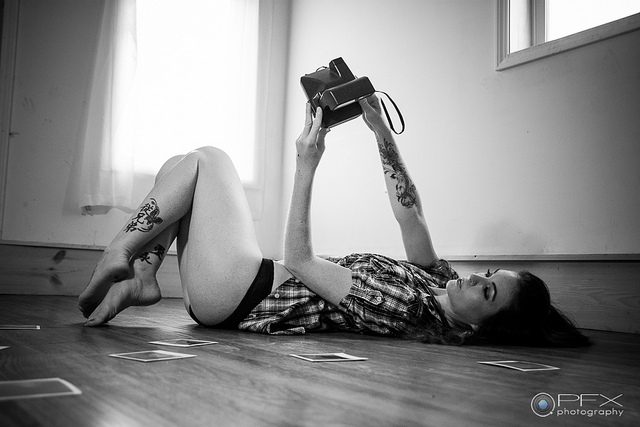*Editor’s Note: There is no denying the negative ways social media can impact our happiness and self-esteem, but there are a few people out there who document their virtual lives to do good by their followers and send an empowering message. Check out some of my favorite body-positive Instagram feeds here, here, and here.
They say a picture is worth a thousand words, but in a world perpetually flooded with Snapchats and selfies, the only word coming from most of our pictures is “self.”
We are a visual people.
Social media perpetuates the idea that our lives are some kind of photo documentary and will be immortalized in images. We spend more time cultivating the image we present to the world—tweaking and filtering and taking and retaking the same picture until it is just right—that we forget about the less tangible image our personalities show the world.
Our lives have become our own museums, carefully curated to display only the highlights. There are two sides to all of us, and two ways to look at pictures: for the thousand words they say, or the one image they convey.
We spend so much time counting the views on a picture to validate the number of hours spent capturing the perfect angle that the picture itself gets lost in the shuffle. It is valuable only for the confirmation it brings of other people’s approval.
The problem is that this emphasis on photo-documenting every aspect of our lives perpetuates the overwhelming prevalence of body image issues in our culture. We focus more on the image and less on our bodies, and so allow our bodies to suffer for the sake of the image. What should be enjoyable life events become triggers for questioning how we see ourselves and how others see us.
Because we know that the entire day will be photographed and posted on social media for the world to see, we all think we need to go on diets before going to the beach or going out on the town with our friends. But there is a fundamental difference between looking thin and looking happy, and while one may flatter and thrill your self-esteem and make your morning great, the other will change your entire life.
A loss of pounds does not correlate to an increase in enjoyment, but because the picture of the day will last far longer than the day itself, it’s easy to focus our attention on making sure that those images will be as perfect as possible.
Think back to the best day of your life. Now imagine that you lived that same day 10 pounds heavier, but with no cameras and no Instagram posts. Would that day still be the best? Would the enjoyment of the day change if your clothes were one size larger?
Part of the problem is that we all need attention, and it can be addicting. When we post pictures and everyone likes them, we feel a sense of pride and approval. If fewer people “like” our post, or we see it and think that we look fat or less than perfect, we strive toward improvement. We continue to post the types of pictures that get the most likes, and try to repeat the practices that were met with the most approval.
Unfortunately, the most recognized and complimented pictures are often those in which we are the thinnest or demonstrate that we’ve lost weight. This approval can begin a dangerous cycle. When we drop a few pounds, we are complimented and told that we look great. Clothes fit “better,” we are skinny like we feel we “should” be, and it feels wonderful. So we continue to lose more and more weight, and get skinnier and skinnier, hoping for more compliments—and sometimes it gets out of control.
But there is no stopping point. Because if we get positive attention for our posts, then the opposite must also be true.
When we spend so much time looking at other people’s social media posts and pictures, and in turn base our knowledge and opinions of the person on what those posts and pictures look like, it seems only natural to assume that others are doing the same to us. Every time a new picture of me emerges on a site, I stress for days about whether or not my friends will see it and think that I’ve gained weight. I know that I shouldn’t, but it’s just so easy to get caught up in wondering how I look online versus how I feel in real life.
But the obsession needs to stop. It’s time to focus on the big picture of our lives and stop obsessing over how we look in every individual picture on social media, or even in our own heads.
I know that I am guilty of being hard on myself—wishing to be thinner, feeling fat, and refusing to eat fattening foods. But it feels like every single day of my life I’m fighting between two opposing forces: eat, drink, and be merry, or stay skinny and be hungry.
As much as I hate to admit it, our social-media-obsessed lives do have an impact on how we feel about ourselves, especially those of us with a history of having a negative self-image. If we have suffered from an eating disorder, instead of just being obsessed with diet and exercise like so many others, we are never allowed to mention that we feel fat, or look fat, or have gained weight, or, god forbid, have even considered going on a diet. We are left to scream in silence, tormented by the knowledge that the world seemed to like us so much more when we were so much less.
If we gain a few pounds or our go up a size or two there is no social norm to support our decision. No one is going to “like” the before and after pictures of us going from too skinny to normal, because they will look like the pictures were posted in reverse order compared to the standard weight loss progress post. There is a double standard happening and it is not acceptable.
Where is the cutoff? At what point are we no longer complimented and rewarded with attention and congratulations? For those of us trying to recover from eating disorders, the pain and humiliation of no longer fitting into that perfect pair of jeans is a constant battle. We must make a choice: stay healthy and be ignored or go back to the land of the skinny where compliments and cute selfies are in unlimited supply. There are, of course, situations in which individuals need to change their lifestyle and lose weight for health purposes. In those cases losing weight is a great thing, and should be rewarded by positive reinforcement on social media sites. But that is not the norm in our society. The vast majority of the population claim to be on a diet at any given moment. Such perpetual diets probably are not for health purposes, but to fit the mold of whatever visual stereotype is currently in vogue.
We starve our bodies to feed our egos.
Recently, I married my best friend. The lead up to the day was stressful, to say the least, as anyone who has gone through planning a wedding understands. Choosing a photographer was particularly difficult, mainly due to the number of people reminding me constantly that we would “look at these pictures for the rest of our lives” and that “the photographer is one of the most important people at the wedding.” I searched and worried for weeks before finally committing to one person, but continued to worry even after the event was over. The day of the wedding my hair did not look the way I wanted it, my makeup wasn’t exactly right, I was bigger and heavier than I’d been in years, and pale from a winter spent indoors. I was stressed and terrified about what I would look like in the photos.
The pictures came out beautifully.
All of the aforementioned “flaws” are in the images, but it doesn’t matter. In those pictures, all you see is love. The happiness and joy of our friends and family is palpable, and made me realize the truth about photographs: They may not be visually perfect, but they tell a story more perfect than I ever imagined possible.
What it comes down to are experiences and feelings. They are all that we are left with and so should be all that matter.
The pictures are wonderful, but the memories are better.
A wedding is a celebration of love between two people. It is not a celebration of getting thin. It is not the sum of all the posed photographs. The day will not be made better by fitting into a smaller size dress. That beach weekend with our girlfriends will not be more fun if we shed a few more pounds. If our friends or partner will enjoy us more when there is less of us, there may be bigger things going on in our relationships. If the opinions and “likes” and hearts on the event pictures mean more to us than the event itself, then we are missing something spectacular that we will never get back.
The idea behind a photograph is nostalgic and a bit romantic, capturing a moment in time, creating tangible memories, immortalizing our lives. The problem is that the picture itself has become more important than the moment it is meant to capture.
Egyptian pharaohs spent their lives commissioning elaborate objects and portraits and statues to be built for their afterlives because they believed in their own immortality. The objects were beautiful and far outlived pharaohs, but the pharaohs themselves were never able to appreciate them. Our hard-drives and Instagram pages might exist far beyond our years, but those years are all we get.
My hope is that we can stop trying so hard to look picture perfect for a perfect picture life, and aim instead to live the lives we’ve always pictured.
Author: Gabriella Sweezey
Image: Flickr
Editor: Emily Bartran


 Share on bsky
Share on bsky





Read 1 comment and reply